| |
 |
|
|
Mission of the Age
Ever since Chinese Opera became an established artistic form, it has become an important form of recreation for royalty and aristocrats as well as the common people in the Chinese world. During the 19th and 20th centuries, Chinese Opera had been preeminent with popular stage performances featuring many outstanding actors. |
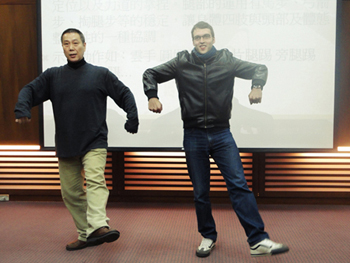
▲ 2011.02.21 A workshop on martial arts fighting on stage at Central University: students experience walking like a role with a painted face.
|
However, with the rise of the film and television industries, and faced with the competition of many new types of entertainment, to a large extent drama faded from the mainstream stage.
Traditional drama had became a kind of elite art form, one could even say it represented a kind of cultural heritage and had assumed an elevated position in society, but it also became less of a part of people’s daily lives. For a living art like Chinese Opera with its roots in the Chinese soil, leaving the earth that provided it with life and nourishment turned it into a kind of artificial specimen; this is particularly true about Chinese Opera in Taiwan which is not its original home.
Though Chinese Opera came to Taiwan early and affected the development of Taiwan’s drama, it was only in the chaotic times of war in 1949 that it finally took root in this land. At such a distinctive time and space, the elite performers of three military theater groups, Lu Guang, Hai Guang, and Da Peng, settled down in Taiwan and extended the life of Chinese Opera in Taiwan. In 1995, the three military theater groups merged and formed the Guoguang Opera Company. This is an important watershed in its history as Chinese Opera emerged from its military confinement while encountering the new cultural impact of globalization. As the embodiment of Chinese Opera culture in Taiwan, the Guoguang Opera Company has carried out its responsibility to continue and develop this cultural tradition. We cannot expect that Chinese Opera will ever again become a truly popular form of entertainment activity, but we are determined to find a new position for Chinese Opera in these modern times to oversee its development in Taiwan and anticipate a brighter future. |
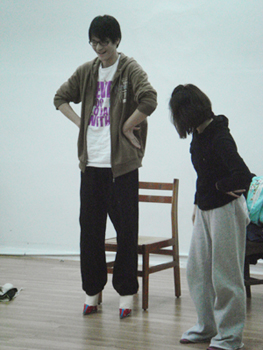 |
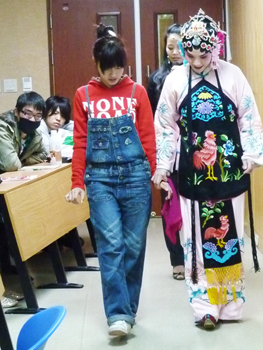 |
|
▲ 2010.01.05 A workshop at Taiwan University: Students experience walking in stilts.
|
▲ 2010.12.15 A workshop at Taiwan Normal University: students experience walking like a "huadan".
|
|
|
Education and Marketing
Due to Western influences and the changing times, the performance and content of Chinese Opera cannot be easily understood by modern audiences. Thus, education is essential to shorten the distance between Chinese Opera and modern audiences. From the very beginning, artistic education has been an important part in the planning for future direction for Guoguang Opera Company. To enlarge its audience by attracting audiences from different age groups, Guoguang has held many promotional activities in various communities, schools, companies, and even foundations over the past dozen years in order to help more and more people appreciate Chinese Opera. For example, drama camps for teachers were held to cultivate “seed teachers”; activities such as “Chinese Opera on Delivery” and “Viewing Performances in Guoguang’s Theater” were held for grade-school and junior-high-school students, and promotional and marketing workshops were held on college campuses in addition to providing annual performances. In order to present Chinese Opera to a broader audience, the company released a series of three DVDs entitled “Marvelous Chinese Opera.” The series has proved popular among teachers. With its effective marketing and educational strategies over the past dozen years, Guoguang has much to show for its efforts. For example, whenever Guoguang puts on a performance, many young people are among the audience, and this is particularly true for any new production in which young participants make up as much as 70% of the audience. This is in stark contrast from the past when most of the audience in traditional theaters consisted of the middle-aged and the elderly. Now young audiences invest the traditional stage with new energy. |
|
|
|
Reproducing Classics and Passing on Traditional Aesthetics
New viewers are different from earlier ones in that they are easily moved by the storyline and the overall production, or even a tune or a particular scene, even though they may not understand the si-gong and wu-fa in Chinese Opera or the art of individual schools. Well-written new operas can attract these young people to the theater, but as they do not have the same aesthetic values as the traditional audience, they tend to keep a distance from the traditional Chinese operas.
|
 ▲ 2009.5.20 GuoGuang was invited to perform "The Fork in a Road" and "Hiding in a Wardrobe" on May 20, 2009, in the activity of promoting Chinese Opera in Junior High School Campus, part of the promotion cultural and educational project held by the Educational Center and sponsorded by the Taipei City Department of Cultural Affairs. Students of Fang-he Junior High School came to GuoGuang to watch the performances. Actor Xu Xiao-Chu who acted as the host for the event demonstrated on stage for the students.
▲ 2009.5.20 GuoGuang was invited to perform "The Fork in a Road" and "Hiding in a Wardrobe" on May 20, 2009, in the activity of promoting Chinese Opera in Junior High School Campus, part of the promotion cultural and educational project held by the Educational Center and sponsorded by the Taipei City Department of Cultural Affairs. Students of Fang-he Junior High School came to GuoGuang to watch the performances. Actor Xu Xiao-Chu who acted as the host for the event demonstrated on stage for the students. |
The acting skills in traditional Chinese opera make these operas enjoyable, but the structure of these operas tends to be loose, the plots are cumbersome, and the values presented in them are out of fashion.
But these operas are traditional classics rich in artistic heritage of Chinese Opera. If writing new scripts marks out a future for Chinese Opera, these old operas carry the essence of the past, and neither is dispensable. Thus, Guoguang has been working hard to help new audiences understand the beauty and value of classic operas.
In recent years, “a series of performances on certain themes” has gained much attention. “A series of performances on certain themes” means putting on operas that deal with a particular theme or concept, such as “the series of forbidden operas”, “The Legendary Yangs on the Battlefield”, “The Blue Sky after the Rain: Justice Served”, “Green Dragon and White Tiger: Entanglement for Three Generations”, “Ghosts, Madness”, “Women in Power”, and “Emperors on Stage”. Presenting old operas by focusing on certain aspects, such as politics, current events, folktales, performance, and culture, is a marketing strategy to attract the audience’s attention which offers a new perspective for the modern audience when watching old classics. Such a strategy can help viewers derive a new kind of pleasure when watching the performance and shorten the distance between the modern audience and traditional operas. The theater has become a big classroom for teaching the aesthetics of traditional opera. |
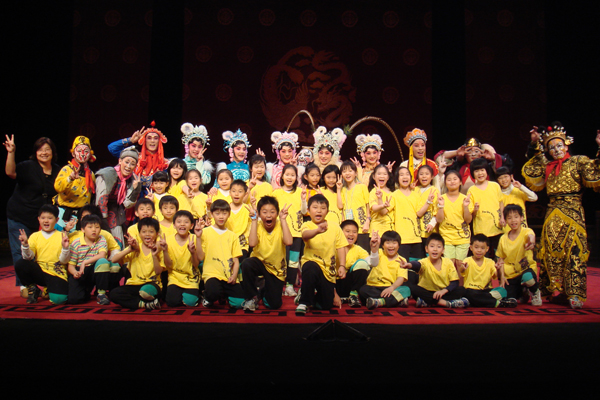 ▲ 2010.04.01 Class 1 of the third graders in Minsheng Elementary School watched "The Bottomless Cave" at GuoGuang and had a gorup picture taken with the actors after the performance.
▲ 2010.04.01 Class 1 of the third graders in Minsheng Elementary School watched "The Bottomless Cave" at GuoGuang and had a gorup picture taken with the actors after the performance. |
Embracing the Audience in a Friendly Way
In this changeable era of globalization, many traditional cultures face serious challenges. In Taiwan, though Chinese Opera was once called “National Opera” and has long enjoyed government support, drastic changes have made its situation difficult. Since its founding, the Guoguang Opera Company has coped with such difficulties, and in the past dozen years it has tried to present the operas to people of different backgrounds to meet their demands and interests. Be it in marketing, writing and acting, or education, the strategies taken up by Guoguang are different from those in previous times, and the results have gained good reviews from correspondents in Taiwan. Chen Yiu-Chi, a correspondent of Straits City News, is the author of the article, “Dialogue between Chinese Opera and the Young Heart: How Guoguang Opera Company in Taiwan Attracts New Audiences.” The article praises Guoguang for the effective strategies it took. Though Chinese Opera originated in China, and its tradition is more deeply rooted there than in Taiwan, and though in recent years the Chinese government has broadly invested in all kinds of cultural undertakings making for a bright future for Chinese Opera, it still faces the possibility of dwindling audiences. In its recent tours of China, Guoguang surprised many in the field by its series of promotional and marketing activities. Guoguang’s experience offers an important frame of reference for promoting education of traditional drama in the Chinese world. We truly believe that innovation is based on the traditions of time-tested values, and we will adhere to this concept and continue to work hard to pass on and develop the culture of Chinese Opera culture in Taiwan and do whatever it takes to reach our goal. |
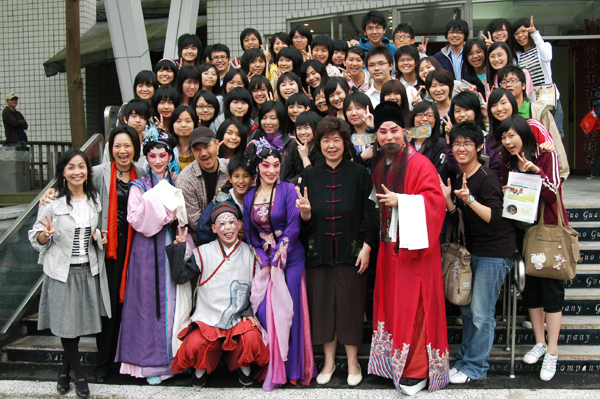 ▲ 2008.4.12 "Mr. Goodman Dumps His Wife", a new experimental Chinese Opera, was performed for students from Xinzhuang High School on April 12, 2008. A group picture was taken with the playwright and Art Director Wang An-Chi, Director Lee Shiao-Ping, and actors Tang Wen-Hwa, Zhu Sheng-Li, Chen Mei-Lan, and Xie Guan-Sheng.
▲ 2008.4.12 "Mr. Goodman Dumps His Wife", a new experimental Chinese Opera, was performed for students from Xinzhuang High School on April 12, 2008. A group picture was taken with the playwright and Art Director Wang An-Chi, Director Lee Shiao-Ping, and actors Tang Wen-Hwa, Zhu Sheng-Li, Chen Mei-Lan, and Xie Guan-Sheng.
|
|
|
|
| |
|
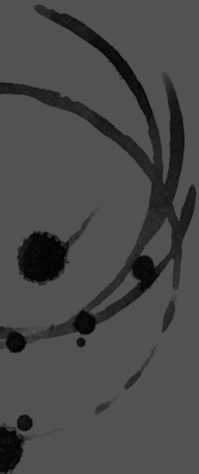 |
|
|